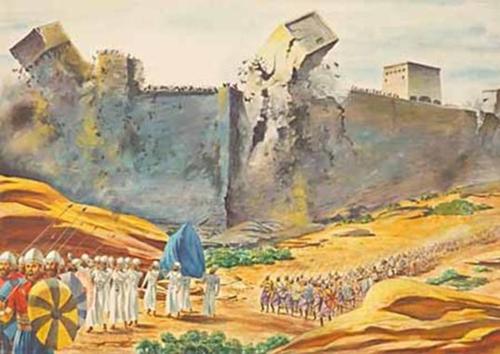 “And having spoiled principalities and powers, he made a shew of them openly, triumphing over them in it.” Colossians 2:15
“And having spoiled principalities and powers, he made a shew of them openly, triumphing over them in it.” Colossians 2:15
Victory shouts and exultant cries of wilderness-weary Israelites still punctuated the air when Achan scrambled over the collapsed walls of Jericho. Pandemonium reigned. Conquered warriors were herded down cramped streets, wails and screams of Canaanites assaulted his eardrums, and bystanders were swept up in the post-battle operations. As he stopped to catch his breath, Achan’s eyes fell on some irresistible spoils. He had not seen new clothes for nearly forty years, and possibly had not possessed gold or silver coins since he left Egypt. It looked easy enough to pick it up without anyone paying attention. But the command was clear: “And ye, in any wise keep [yourselves] from the accursed thing, lest ye make [yourselves] accursed.” Joshua 6:16 KJV.
In the Hebrew, the word accursed (charam {khaw-ram’}) is a strange word. In some places it means to destroy utterly. In other instances, it carries the meaning to devote or consecrate. Most of the time, the two intentions were carried out in the same act. To devote something, especially to God, one must destroy it. To sanctify it, one had to kill it (as in a sacrificial offering). Keeping something that was accursed made the keeper accursed. “But keep away from the devoted things, so that you will not bring about your own destruction by taking any of them. Otherwise you will make the camp of Israel liable to destruction and bring trouble on it. All the silver and gold and the articles of bronze and iron are sacred to the LORD and must go into his treasury.” Joshua 6:18. God’s intention was not to literally destroy the vessels of silver and gold, but that the children of Israel would so disclaim them, so devote them to God that it would be the same as if they were utterly destroyed.
Achan’s greatest crime was not that he took what belonged to Jericho, or from his fellow Israelites. It was not even that he coveted, stole or hid something. It was his unforgiveable failure to discern the spoils of God. He usurped the divine prerogative. He dared to claim that which was owned by God Himself.
What did Achan take? Gold: God’s glory which represented doctrinal purity and lives tempered with fire. Silver: This was a type of redemption. Garments: Articles of clothing represented image and identity. By taking the silver and gold, Achan was telling God that he could take care of himself instead of depending upon God; that the manna, the water and the quale were paltry miracles; that the deliverance from Egypt was coincidental; that the crossing of Jordan was meaningless; that the walls of Jericho would have fallen down anyway; that he owed nothing to God for his deliverance and inheritance; that instead of Achan conquering Jericho, Jericho conquered Achan. Outside Jericho, Achan knew his only hope was God; inside Jericho, he proclaimed victory, and himself the hero.
Never forget that Jesus won your victory! It was his blood, his life, his death, his resurrection. Your efforts had nothing to do with your eternal salvation. He spoiled principalities and powers for you! Jesus took the initiative; he came down to your level; he identified with you. Now He wants you to identify with Him! You are God’s spoils! Your abilities, talents, gifts, ministries, plans, desires—-all are devoted to God. Your dreams are God’s, not yours! Don’t touch God’s Gold! When you choose convenience over conviction; pleasure over power; personal gain over kingdom-mindedness; sales over service; or security over sacrifice, you are stealing God’s property. Your devotion to God must be so complete that it would be as though you are destroyed unto yourself. If you have buried God’s gold, dig it up and bring it back. The spoils belong to God!